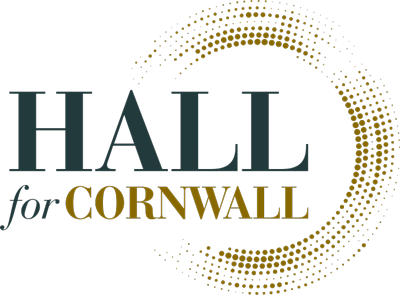
ROCK N RHYTHM COMPETITIONS AT CITY HALL

The Druids, 1960.

A programme from the later years of the competition. The programme detailed the running order, judges and names of musicians and their respective bands.
Hall for Cornwall has a rich musical history dating as far back as the 1850s. Although primarily functioning as a municipal building in the 19th century, the old town hall played host to a variety of musical events. Indeed, the Green Market section of the building became the People’s Concert venue in 1858 after a series of popular recitals and ‘grand musical entertainment’. This long and varied musical legacy thus continued into the 20th century, when in 1925 the old Green Market was transformed into a performance space, thus marking the birth of City Hall.

Episode 5 performing at City Hall as part of the 1967 Rock N Rhythm Championships.
Sounds from The Annexe
35 years later and a new lease of musical life was breathed into Truro with the advent of the first Rock N Rhythm Competition at City Hall’s Annexe. The competition was organised by the City of Truro Round Table and had its roots in the venues early Rock and Roll and Skiffle contests. It quickly became a mainstay of the Truro music scene, attracting a wide variety of bands from across the county as well as a lively teenage audience.

A competitor’s ticket giving entry to the City of Truro-run event.

Cosmonauts, 1967.
Audiences of 1000
The competitions would begin in the evening and would typically last for around 3 hours, within which there would be a tight turnaround with the first band setting up behind the main stage curtain whilst the next band set up behind the stage backdrop.

1967 Competitor Line-up as reported in the West Briton.
There would then be an interval where the previous year’s winners would return to perform for an audience of up to 1,000 during the competition’s heyday.

An expectant audience awaits the bands during the 1962 contest in City Hall’s Annexe.
Chain Reaction
The bands that entered the contest were typically already familiar names on the Cornish music circuit, having performed at discos and teenage dances all over the county. The exception to this was in 1965 at the fifth annual Rock N Rhythm Competition which featured a young Roger Taylor on drums for Johnny Quale and The Reaction. Although the band stunned the audience with their well-rehearsed routine, they only managed to place 4th as a result of the judge’s decision that the group were entirely unknown and therefore unable to deliver a full evening’s performance. With much criticism ensuing from an angry audience, the judges instead voted Roger Taylor best musician and Johnny Quayle best vocalist. The band thus returned to City Hall as The Reaction in 1966 and to no surprise took home the first-place title.
The Reaction live on stage at City Hall featuring Roger Taylor. Video via ArtCornwallVideo
Rock-A-Boogie Shuffle
In 1962, radio and television personality Alan Freeman offered his judging services, selecting The Staggerlees from Redruth as the ‘Champions of Cornwall.’ The band performed a winning instrumental medley including ‘Rock-a-Boogie Shuffle’, ‘FBI’ and ‘Tea for Two’ after tying with The Druids from Bodmin. The Druids were nevertheless quick to reclaim their title and won for the second time in three years in 1963, with a 14-point lead over their nearest rivals. However, in 1965, The Couriers from Devon took over as judges in response to competitor complaints that those of previous years were not in touch with the latest sounds. In later years, however, the judging was eventually taken over by representatives of local institutions, such as the Flamingo Ballroom, Winter Gardens and Princess Pavilion.

Staggerlees, 1962 winners of the Rock N Rhythm Championships.
As well as winning the title of the ‘Champions of Cornwall’, bands were also awarded a silver cup trophy with the additional enticement of pursuing various musical opportunities. For instance, in 1966, the three top-placing bands were promised auditions with the BBC with the winning band The Reactions given the chance to support Gerry and the Pacemakers on tour. 1967’s winners were also offered the chance to enter a recording contract with 4 Star Sound Productions. However, it is unclear whether any of these opportunities ever materialised.

An impressively long and very official-looking winner’s certificate from 1962, the year The Druids reigned triumphant.
Top Groups Championship
By 1968 the competition had been running for almost a decade. This inspired an attempt to ‘move with the times’ by changing the contest’s name to ‘Top Groups Championship.’ This change in direction also witnessed a shift in the calibre of judges that were selected for the competition.

A poster for the new-format competition, 1970.
In 1969 and 1970, the competition was subsequently judged by Alex Leslie who had just left his position as road manager for the Spencer Davis Group. Newspaper articles thus reported these two years as the first time that the competition had been judged by an actual pop expert after fans had voiced upset about the fairness of using local or otherwise unknowledgeable judges.
With a dwindling audience, outdated format and changing musical landscape, the competition eventually ran its course and was held for the last time at City Hall annexe in 1972.

Safron, 1970. Image via Kernowbeat © Chris Sims.
All images have been provided with kind permission of Kernowbeat, the most in-depth resource for rock and rock venues across Cornwall in the 1960s and 1970s.

